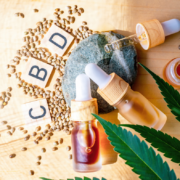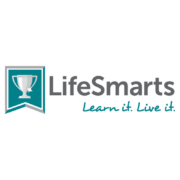May 2, 2023
Media contact: National Consumers League – Melody Merin, melodym@nclnet.org, 202-207-2831
Photos from the 2023 National LifeSmarts Championships can be found here.
The team from Maryknoll School in Honolulu, Hawaii, was crowned the 2023 National LifeSmarts Champion in Cincinnati, Ohio, this past Sunday, April 30. In 29 years of LifeSmarts competition this is the first-ever win for The Aloha State.
The all-senior team, coached by Kit U Wong, competed against Dallas High School from Dallas, Pennsylvania, in the championship match. The 2023 members of the team from Hawaii include: Captain Chris Ho, Adam Nelson, Maddi Agustin, Kaitlyn McLeod, and Benson Leung.
Joining Hawaii and Pennsylvania in Sunday’s semifinal matches were teams from Georgia and Rhode Island. Teams from the District of Columbia, Kansas, Washington, and Wisconsin all made it to the top eight.
Forty-two student teams traveled from across the country to compete over four days at the iconic Hilton Cincinnati Netherland Plaza in Downtown Cincinnati.
“This year’s Nationals, like past competitions, were riveting,” said LifeSmarts Program Director Lisa Hertzberg. “Each year, teams from across the United States come ready to compete, learn from each other, and enjoy their time together. We are thrilled for Team Hawaii’s first ever-win. Congratulations to the Maryknoll Spartans!”
“I commend all of the students who competed hard and demonstrated such a breadth of consumer knowledge,” continued Hertzberg. “They are the best and brightest from across the country, and they should all be proud of their accomplishments.”
LifeSmarts is an education and scholarship program run by the Washington, DC-based National Consumers League (NCL), the nation’s oldest consumer advocacy organization. It competitively tests high school students’ knowledge of consumer awareness, with subjects including personal finance, health and safety, consumer rights and responsibility, technology and workforce preparation, and the environment. LifeSmarts is available in all 50 states, the District of Columbia, and in partnership with student leadership programs such as 4-H, BPA, FBLA, FCCLA, SkillsUSA. and others.
Each student on the first-place team received a $1,500.00 scholarship; second-place team members received $1,000.00 scholarships; and third-place team members received $750 scholarships. Team members who placed fourth received gift cards.
Teens from each of the 42 teams represented at Nationals also competed as individuals, and the top-scoring student in each LifeSmarts subject received a $500 scholarship from NCL. The 2023 winners are:
- Consumer Rights and Responsibilities: Lucas Carver, Pennsylvania
- Environment: Hannah Christianson, Washington
- Health and Safety: Marie Popielarz, Pennsylvania
- Personal Finance: Mahi Dohl, Pennsylvania
- Technology and Workforce Preparation: Chris Ho, Hawaii
Natalie Keller from Selah High School in Washington State and Gabe Laster from Norton Wild Card 9 from Lebanon, Missouri, were awarded co-LifeSmarts Students of the Year. They each received $100 Amazon gift cards.
Winning recognition as LifeSmarts Coaches of the Year were Tina Steinert from Kansas, Dave Handt from Varsity Wild Card 4 from North Dakota and Bea Roberson from Oklahoma All three LifeSmarts coaches received $100 Amazon gift cards.
LifeSmarts State Coordinator of the Year was awarded to Brittani Lee, Georgia State Coordinator, who has been a devoted advocate for LifeSmarts for many years, growing the state program and seeing four teams from Georgia advance to this year’s National LifeSmarts Championship.
The Sarah Weinberg LifeSmarts Memorial Scholarship, given each year to a student who demonstrates an extraordinary commitment to community service, was awarded to Kaitlyn Johnson of Delaware.
NCL’s partnership with UL Standards & Engagement has elevated the issues surrounding counterfeit products. Winners of the Be Safe Buy Real digital poster contest were Bianca Murphy from Colorado, Kianna Siebert from Minnesota, Marie Popielarz, Caiden Brown from Texas, Aminah Ali from Texas, Jesse Peddycord Contreras from Varsity Wild Card 4 in North Dakota, Samuel Steele from Kansas, and Jesse Taylor from Kansas. Bailey Bennett and Anunya Madhavaraman—both from Georgia—were JV (middle school) winners. Each recipient received a $100 cash prize.
Winners in the Norton Identity Theft essay contest were Kaitlyn Johnson, Reyna Brown Muhammad from Alabama, Joe Rutledge from Georgia, Allie Higgins from Idaho, and Alison Thompson from Wisconsin. Each received a $1,000 scholarship for their winning essays providing solutions to identity theft.
Johnson & Johnson Consumer Inc. sponsored five scholarships which were awarded to students who impacted their communities with presentations and social media campaigns about OTC medicine safety. Winners were Emma Bayer of Norton Wild Card 2 in Georgia, Bryan Cabrera Icte from Delaware, Luis Felipe del Solar from Louisiana, Seth Moon from Georgia, and Kianna Siebert.
The LifeSmarts Team Spirit Award went to Calhan High School. The team from Colorado demonstrated outstanding camaraderie and great sportsmanship throughout the four-day championship.
The social media awards for most engaged on Instagram and our new meme contest were very popular among the students. The best meme went to Alyssa Harmon from Norton Wild Card 8. The Instagram winners were Amelia Gindorf from Arizona, Jada Sturdivant from Alabama and Autumn Negen from the Norton Wild Card 8 team. Each team also created a t-shirt and votes for the People’s Choice were collected on Instagram with that award went to the Washington team. The judge’s selections were Alabama and Oklahoma.
Sponsors of the 2023 National LifeSmarts Championship are as follows:
Platinum: Amazon, Johnson & Johnson Consumers Inc., Norton
Gold: Discover, Tide
Silver: Comcast, FICO, Melaleuca, Meta, P&G, Toyota
Bronze: American Express, JPMorgan Chase, UL Standards & Engagement, WSECU
At Sunday’s closing ceremony, NCL also announced that the 2024 National LifeSmarts Championship, which marks the program’s 30th anniversary, will take place in San Diego, California.
To learn more about LifeSmarts, visit www.lifesmarts.org.
LifeSmarts is a comprehensive consumer education program that is free to middle school and high school students and educators. The goal of the LifeSmarts program is to create consumer-savvy young people who will be better equipped for adult life in today’s complex, global marketplace. Visit LifeSmarts.org for more information. LifeSmarts: Learn it. Live it.
The National Consumers League, founded in 1899, is America’s pioneer consumer organization. Our mission is to protect and promote social and economic justice for consumers and workers in the United States and abroad. For more information, visit nclnet.org.




 By Nancy Glick, Director of Food and Nutrition Policy
By Nancy Glick, Director of Food and Nutrition Policy














